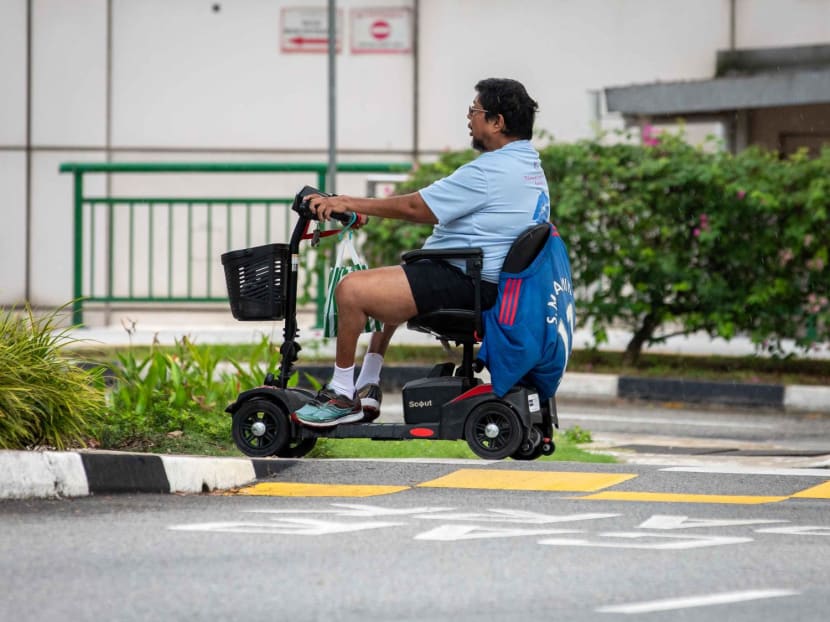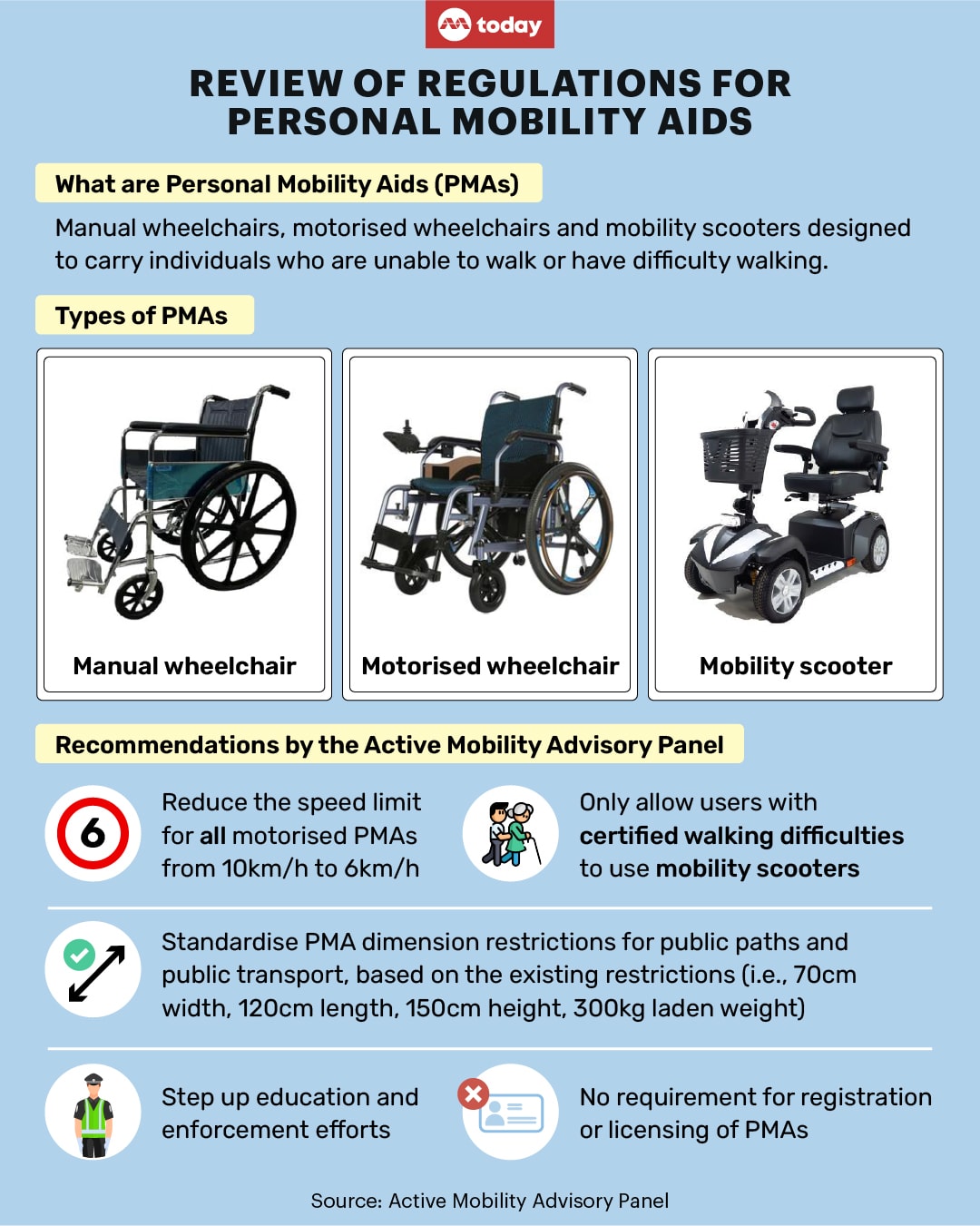Medical memo, lower speed limit among recommendations to curb misuse of personal mobility aids by able-bodied persons
SINGAPORE — To curb the misuse of personal mobility aids (PMAs) by able-bodied persons, only people certified by a medical professional to have problems walking will be allowed to use mobility scooters, if a new set of recommendations is accepted by the Government.

A set of recommendations were released by the Active Mobility Advisory Panel on Dec 14, 2023, on the use of personal mobility aids.
- An advisory panel for active mobility put up a set of recommendations on the use of personal mobility aids, which include mobility scooters
- One was that the use of these units be restricted to people with certified walking disabilities
- This is part of a wider set of recommendations to curb misuse by able-bodied users
- Other recommendations covered restrictions on the speed limit and the size of such mobility aids
- The recommendations have been submitted to the Government for its consideration and possible implementation in the future
SINGAPORE — To curb the misuse of personal mobility aids (PMAs) by able-bodied persons, only people certified by a medical professional to have problems walking will be allowed to use mobility scooters, if a new set of recommendations is accepted by the Government.
In a report published on Thursday (Dec 14), the Active Mobility Advisory Panel that oversees the safe use of active mobility devices set out five key recommendations to ensure the safe and responsible use of such units.
PMAs refer to manual wheelchairs, motorised wheelchairs and mobility scooters, designed and intended to carry a person who has difficulty walking.
The recommendations were submitted by the panel to the Government on Thursday after a series of focus-group discussions with various stakeholders in June and July.
The stakeholders consulted included PMA users, caregivers, representatives from a disability-focused organisation and the National Delivery Champions Association, which represents freelancers and self-employed persons whose main source of income is from food delivery or package delivery.
Speaking at the sidelines of a media briefing on Thursday, the panel's chairman Baey Yam Keng said that the Government will review the recommendations and consider implementation at a later date.
Mr Baey is also Senior Parliamentary Secretary for Transport.
WHY IT MATTERS
The use of PMAs is subjected to relatively lax regulation. Users are not allowed to go on the roads and are subject to a maximum speed limit of 10km/h.
Unlike personal mobility devices such as electric scooters, PMAs are allowed on footpaths and at void decks of public housing blocks.
The panel said that it decided to review such devices because there have been increasing concerns about the misuse of these units, especially mobility scooters, by able-bodied persons.
These include the use of overly large devices and using them in an unsafe manner such as by speeding.
Mr Baey said: “The Active Mobility Advisory Panel decided to review the current guidelines in order to pre-empt a situation where there are a lot of disamenities or accidents happening and that would affect genuine users from continuing the use of PMAs.”
TODAY has asked the Land Transport Authority (LTA) for figures on incidents or complaints relating to the irresponsible use of PMAs.
People with a genuine need for such mobility aids have also found that these problems have “tarnished the reputation of PMA users”, the panel said.
It reviewed practices done in other jurisdictions such as in Australia, Spain and the United Kingdom before coming up with the recommendations.
Including Mr Baey, the panel has 16 members who are representatives from LTA, National Parks Board, the Traffic Police and a non-profit organisation focused on people with disabilities.
TODAY takes a look at the panel’s five main recommendations in the report and the considerations behind them.
MEDICAL CERTIFICATION REQUIRED
- The panel recommended allowing only users who are certified to have medical needs or walking difficulties to use mobility scooters
- This can be in the form of a memo from a registered medical professional
- However, users who already have an existing certification or disability identification will not have to go for more assessments
- The recommendation applies only for mobility scooters, because the feedback of abuse among able-bodied users are typically linked to such units only
- This targeted approach aims to minimise the impact on users with genuine need who are using manual and motorised wheelchairs
- The panel said that it did not recommend having a blanket allowance by age, because it may lead to a proliferation of PMA usage
LOWER SPEED LIMIT
- The panel recommended lowering the maximum device speed for all motorised PMAs to 6km/h from the current 10km/h to better reflect the intended use of these units, which is to replace walking for their users
- Transitionary measures should be put in place to allow genuine users to use their existing PMAs but at a lowered speed
- Retailers will be required to sell PMAs with a maximum speed of not more than 6km/h, with reasonable transition time given to them to make necessary changes to their business
RESTRICTED SIZE OF MOBILITY SCOOTERS
- The existing dimension restrictions on PMAs for public transport should apply to devices used on public paths, the panel said
- LTA imposes a dimension restriction of 70cm by 120cm by 150cm with a 300kg laden weight for PMAs on public transport
- A small proportion of users who may need to use bigger PMAs for medical reasons will be exempted from this requirement
MORE AWARENESS
- The panel recommended that public education efforts be ramped up on who can use PMAs, along with the rules and regulations
- Users should also be educated on the code of conduct when using these units when sharing paths with other users
- Safe usage of PMAs, fire safety tips and safe charging practices should also be taught
- Enforcement should be stepped up with appropriate penalties to deter the sale of non-compliant devices, the panel said

NO LICENSING REGIME FOR PMAs FOR NOW
The panel recommends not introducing a licensing regime for users, registration of PMA devices or mandatory training at this point in time.
“While some have called for registration and licensing to increase accountability and enforcement against errant PMA users, its effectiveness must be carefully weighed, including the impact on genuine users,” it said.
It believes that the current set of recommendations will achieve a balance between inclusivity and ensuring safety for all path users.
HOW WILL USERS, DELIVERY RIDERS BE AFFECTED
Mr Baey said that when the panel set out on the review, it was first about promoting active mobility.
“We would like people to live an active life to be able to get around, including people with walking difficulties, and that's where they have been relying on PMAs to get about.”
However, given the bigger and heavier nature of such PMAs, the public is “naturally more concerned about safety”.
“That is why we felt that it's timely for us to look at how we can introduce some recommendations so that people can still enjoy these common spaces.”
Mr Baey also said that genuine users with walking difficulties should not face any adverse impact by the set of recommendations.
He acknowledged that some food delivery riders also use PMAs on their job, and reiterated that users with genuine need for PMAs would not be adversely affected, besides being subjected to a lower speed limit.
Delivery platforms would typically indicate to customers when a delivery is being made by a person with a disability condition and more time is given for such delivery persons to complete the job, he added.
“And I know that customers or members of the public are generally more accommodating towards these people with (such) conditions.”
Asked about the possible time frame for implementation, Mr Baey said that based on past experiences by the panel, the Government would usually take "a few months" to review the recommendation and come up with implementation measures.
Ms Florence Cheong, a panel member and head of Tan Tock Seng Hospital's occupational therapy department, said that PMAs benefit not only people with visible physical disability but those with conditions that cannot be discerned visibly such as cardiopulmonary or renal conditions that limit their ability to walk long distances.
Given Singapore's ageing population, there are “more and more” people who may develop conditions that can limit their mobility, she added.
Asked if the set of recommendations might discourage users with genuine need from using PMAs, she said that it would not.
“I think in the long run, it will benefit them as well as society together, because it will likely be less crowded, have less burden on the infrastructure and (result in a) safer commuting experience for everyone.”











